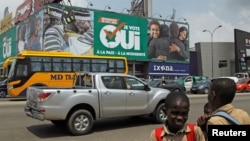A vote on whether to change the constitution is set for Sunday in Ivory Coast, but a lack of public debate about the issues has left many voters frustrated.
"We are not informed,” one man said, after being visited by a member of a civil society group working to spread the word on the proposals. “My parents call me from the village, they are not informed. My dad tells me 'What do I vote for? A text I don't know the content of?' We need to be informed in local languages, so my dad can know what he should do."
The government put the full draft online in French, but the outreach has fallen short, as half of Ivorians are illiterate and many others have limited access to the internet. As for newspapers, many people only read the front pages, which are displayed at the newsstands for free.
Consequently, many potential voters are unaware that the proposed changes in the new constitution include the creation of a senate and a position of deputy president, and the softening of a controversial clause on nationality, which contributed to years of political unrest in the West African nation.
The "vote yes" campaign, however, has been impossible to miss. Big billboards reading "I vote yes to modernity, to development, to social cohesion, to peace" can be seen all across Abidjan.
"There is no debate, all I hear is 'yes,'” one woman said. “If there was a debate, with each side saying why we should vote yes or no, that would help. We've already accepted the yes, since it's the only thing that we hear."
The opposition asserts that the coverage of the campaign has been unbalanced, with the government monopolizing radio and TV.
"We only have the street to express our point of view, so that's what we're doing," said opposition member Jean-Gervais Tcheide.
The opposition has rejected the proposal for changes on grounds there has not been a national consensus around it. Some leaders are calling for a boycott of the ballot box Sunday, while others are campaigning for the referendum to be canceled.
Last week, Ivorian authorities dispersed an opposition protest with tear gas and arrested dozens of people. Amnesty International and Human Rights Watch have called for authorities to respect the right to freedom of expression and association.
"I don't feel concerned," one man in Abidjan said about the outcome of the vote. "That new constitution is useless."
Next to him, another man interjects.
“It's one of the most important for the evolution of our country,” he said. “Even more so that the presidential elections. We elect a president for five years, but this new constitution might stay on for decades to come.”
The result of Sunday's vote is expected to be known by the middle of next week.







